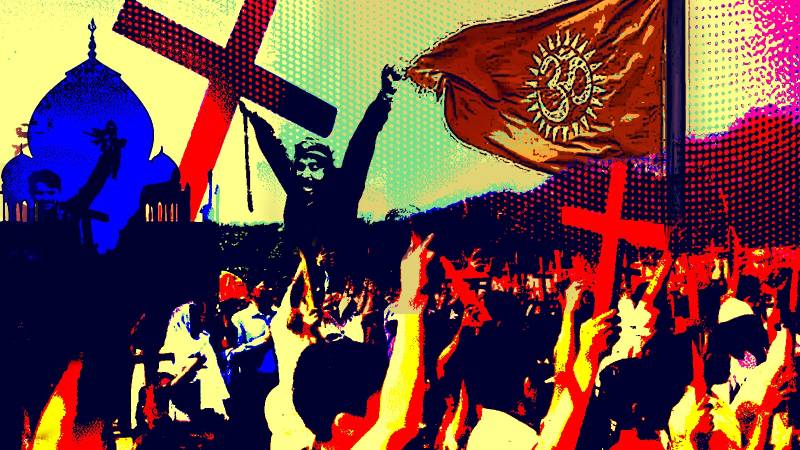
The recent attack on 21 churches and 89 Christian homes in the town of Jaranwala in the Faisalabad district of Pakistan raises questions about how blasphemy laws are used against religious minorities in Pakistan.
The Pakistan Penal Code penalises blasphemy against any recognised religion, providing penalties from a fine to death. Section 295- B of the Act prescribes life imprisonment for anyone defiling the holy book, and 295- C prescribes the death penalty for anyone defiling the name of Prophet Muhammad (PBUH) and other prophets. However, no one has been sent to the gallows so far by the courts. The mobs have taken it on themselves to punish the alleged offenders, often using the law as a tool to dispense justice. It has been observed that before the cases reach the court, the vigilante groups have often taken the matter into their own hands and have attacked the members of the minority communities.
According to the Centre for Social Justice, over 2,000 people have been accused since 1987, with at least 88 have been killed based on unproven allegations.
The Pakistani government, instead of repealing the law or doing away with capital punishment, further exacerbated the situation by increasing the punishment to a life sentence, not less than ten years, for using derogatory remarks against holy personages.
The Human Rights Commission of Pakistan (HRCP), an independent human rights organisation, expressed its concern about the amendment, fearing it would be used to target religious minorities.
Earlier this year, a Chinese national working at a hydropower project was accused by his co-workers of insulting Prophet Muhammad (peace be upon him) by forcing his fellow workers to speed up their work when they were on a prayer break. Luckily, he was arrested by the police before any harm could befall him.
In 2021, a Sri Lankan factory manager was lynched and burned alive for removing a poster featuring religious content.
In 2022, Nautan Lal, a Hindu teacher, was sentenced to life imprisonment by a local court in Ghotki, Sindh, on charges of blasphemy. Lal was arrested in September 2019 after a video went viral on social media in which an intermediate student of the public school alleged that the Hindu teacher had committed blasphemy against the Prophet (PBUH). As the news spread, a protest erupted in the town, and a violent mob attacked the Sacho Satram Dham Temple and damaged its idols in Ghotki. In a rare display of communal harmony, about 500 Muslims guarded the temple to prevent further attacks.
In 2020, Pakistani Christian woman Aasiya Bibi was convicted and sentenced to death by a Pakistani court under the blasphemy law for insulting the Prophet Muhammad (PBUH). Fortunately, the Pakistan Supreme Court set aside the order of the lower court on grounds of insufficient evidence. She later had to flee Pakistan, fearing reprisals.
Salmaan Taseer, the former governor of Punjab and a vocal critic of the law, called for reforming the law as it was being used to target minority communities by the religious extremists and reactionary elements. He paid a heavy price for his views and was murdered in 2011 by his bodyguard Mumtaz Qadri. Islamist groups hailed Qadri as a national hero.
The Hindu community has suffered in different ways at the hands of Islamist groups. According to Asian News International (ANI), around 1,000 Hindu girls have so far been allegedly abducted, forcibly converted, and married off to Muslims. Their appeal to bring a law against such conversions, especially in the Sindh province of Pakistan, has fallen on deaf ears. Even Muslims have not been spared and have been extra-judicially killed over blasphemy accusations.
Across the border, in India, precious little has been done to protect the religious minorities, especially Muslims, Dalits and Christians. It is reported that a total of 63 cow vigilante attacks have occurred between 2010 to 2017, where 24 Muslims have lost their lives due to mob lynching. The surprising part is the government of the day did not condemn these attacks.
There has also been a number of attacks on churches. The silence of the government has only emboldened the perpetrators of the crime.
The Human Rights Watch has reported that there has been a surge in attacks since 2015.
It is true that in any democracy, majoritarianism prevails. However, it becomes incumbent upon the current government to safeguard the rights of the minorities. If this is not done, the social fabric of the country could be torn apart.
It would be in Pakistan’s interest, if they want to preserve democracy, to repeal the law as the continuance of the law would provide legitimacy to vested groups to target minorities. The government is also required to act against the perpetrators of the crime to prevent the misuse of the law.
India, on the other hand, should take effective steps for apprehending all those perpetrators who encourage discord between religious communities. If this is not done, the very rule of law will be endangered.

